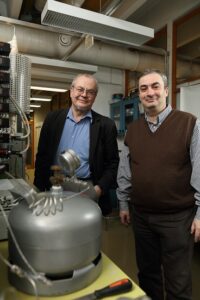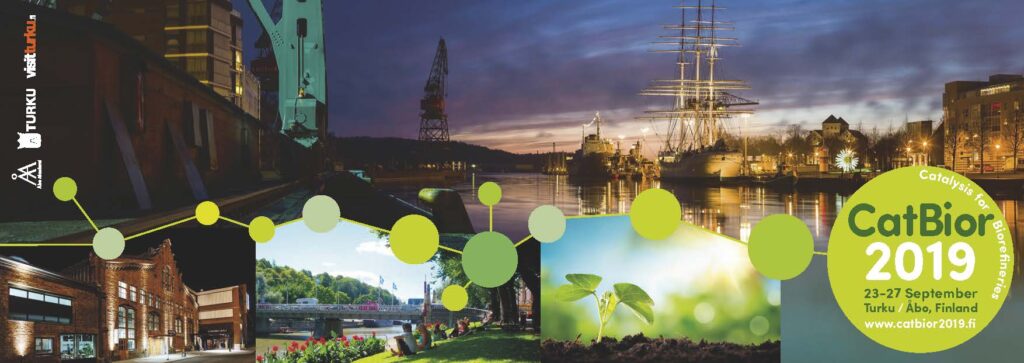20.4.2018
Tapio Salmi and Dmitry Murzin are professors in chemical technology and reaction engineering at Åbo Akademi University. In September 2019 they are organising CatBior 2019, a congress which focuses on catalysis for biorefineries. The subject is extremely important and topical.
“Of course we want to use renewable natural resources. We turn them into environmentally friendly chemicals and fuel components, or at least reach a better balance when we use natural resources and return them back to nature. This differs from a classic refinery that uses limited fossil raw materials.”
“Catalysis combined with the operations of biorefineries certainly is one of the key technologies in the undergoing great change.”
At times, the competition is fierce. This time, everything went fairly effortlessly.
“Dmitry Murzin was asked a few days before the due date of the applications if we would like to participate in submitting one. We decided to say yes,” Salmi describes the situation.

They already had material ready for the proposal as they knew to anticipate the most labour instensive part of the process. In addition, Murzin happened to give an important interview at exactly the right time and the rest, as they say, is history. Åbo Akademi University competed against Dalian in China but won the CatBior 2019 Congress that will now be organised in Turku and for the first time in Northern Europe.
Exchange of ideas and competence
“In science, it is important to exchange ideas and communicate with other people. Sharing and spreading the results of your research,” describes Murzin.
For this reason, Salmi and Murzin are ready to work hard to get other scientists to come to Turku and Finland and participate in high-quality congresses. They are extremely valuable partners for the City of Turku’s Congress Unit.
“The mission of universities, which is stated in the legislation, includes research, education and societal interaction. In fact, congresses are an excellent method of interaction even if they focus on science,” says Dmitry Murzin.
Laboratory of Industrial Chemistry and Reaction Engineering at Åbo Akademi University is among the largest ones in Europe in the field of industrial chemistry and reaction engineering.
“We are well presented in international congresses as speakers and in poster exhibitions. So why wouldn’t we also organise congresses?” says Salmi.
Europacat isstill number one
The Europacat 2007 Congress organised by Salmi and Murzin is so far the largest scientific meeting organised in Turku.
“The lecturers included a Nobel prize winner in chemistry, scientists from all continents, the Minister of Culture and very lively evening program. The congress was a European and, in particular, Nordic joint effort through its multicultural organisation,” says Salmi.
The evening program of the Europacat Congress can be considered a real masterpiece. The congress delegates were transported on 13 ships to the minuscule island of Loistokari. Appetisers were enjoyed aboard the ships that spirited the participants to Loistokari for the main course. The journey offered the international guests a glimpse of the Turku archipelago.
On the second evening, the program featured a concert of Nordic and Slavic church music in the Turku Cathedral. The social program is a great example of the congress participants’ interest in something special and original, not necessarily only luxury.
Salmi and Murzin are happy to organise congresses even if the amount of work is massive.
“Our work has been made possible by the commitment of the entire laboratory team to organise congresses.”
At Åbo Akademi, the Laboratory of Industrial Chemistry and Reaction Engineering is relatively large with around 40 co-workers. For the unit members, congresses present a unique chance to meet and engage with the top scientists of the field.
“In a way, we bring our scientists closer to the international scientific community. We cannot send everyone abroad but they can meet international scientists here.

Secret of success
Congresses are important places for encounters and interaction with colleagues who comment, ask questions and also criticise. Larger congresses are important but it is also necessary to organise smaller events. The topic may be narrower but intense discussions go on for days.
In addition to the Europacat 2007 Congress, Salmi and Murzin have organised the Nordic Catalysis Symposium twice, the Camure 8 & ISMR 7 and CAFC10 events.
With CatBior 2019 soon to be added to the list, Dmitry Murzin says that one of the secrets of success is the division of work. Different people have various responsibilities.
“My colleague Salmi is extremely competent in leading this type of division of work. It would be a very different kind of experience to organise congresses without great leadership,” says Murzin.
“We do not only give out instructions and tasks; we also work together, providing our input and delegating. This is a good mix,” adds Salmi.
One person in charge of the website, another for transport, the third for the social program.
“And the budget,” Murzin adds.
“We work like a government with ministers with their different areas of responsibility,” says Salmi.
“Only we try to work better and argue less,” laughs Murzin.
One challenge remains
The International Symposium in Chemical Reaction Engineering is an event that has not yet been organised in Turku. Salmi promises that they will try to lure them to Turku again. The symposium is organised in Europe only every sixth year, and the competition is fierce. The proposal must be extremely well prepared for the scientific program as well as practical arrangements.
“We always have to convince people how easy Turku is to access.”
Sufficient hotel capacity, number of good-sized lecture halls and easy accessibility are also important for congresses. The City of Turku’s Congress Unit helps scientists in the application, planning and marketing phase of congresses free of charge and the cooperation has been excellent.
For many international scientists, Finland is an interesting and exotic destination. Turku is as effortless to reach from Asia or the United States as the journey is long in any case.
Logomo is exceptionally well suited for the CatBior2019 Congress for which close joint discussions are characteristic. All 300–400 congress delegates congregate in one space. Logomo also has enough floor space for serving lunch and dinner and presenting the scientific posters.
“In the many congresses I’ve been to, the space reserved for the posters has been the weakest link,” says Salmi.
“I think that Logomo is a great addition to Turku’s congress premises. It fills a certain need. Premises of 300–500 people have been needed, and Logomo’s Teatro has solved this problem,” says Murzin, extending thanks to the City of Turku.
